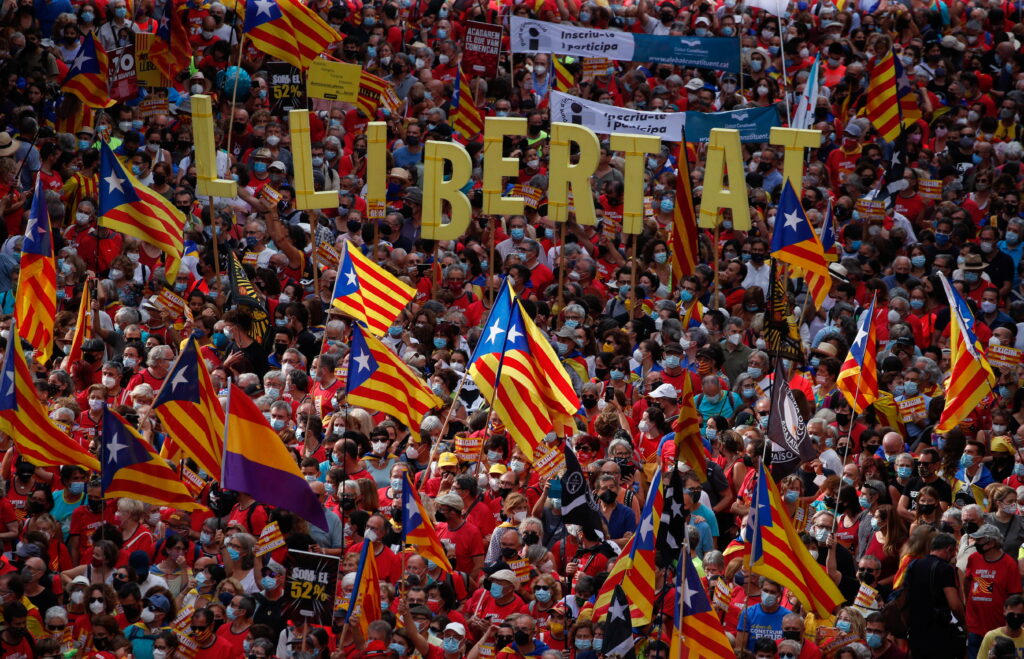
Understanding the Catalan separatism in Spain
In continuation with earlier article that talked about present-day Catalan language & politics association movement. This article is set to explain the history behind.
The date October 1, 2023 marks six years since the Catalan Independence Referendum was held in 2017. Spain’s northeastern Autonomous Community of Catalonia has been at odds with Spain’s central government in Madrid for a long period of time.

The dispute between Madrid and Catalonia, having historical undertones, has continued in the modern era as well. Catalonia’s grievances with Madrid have given way to the Autonomous Community harbouring aspirations to secede from Spain and exist as an independent country.
The tussle between the two sides has witnessed intensification in the past decade which culminated in an independence referendum in 2017 by the Catalan government and the subsequent heavy-handed measures against Catalonia by the central government in Madrid.
What is the issue of Catalan separatism?
The issue of Catalan separatism could be considered from two perspectives – historical perspective from 1714 to 1978 and from 1978 to present.
Historical Perspective
Catalonia’s uneasy relationship with Madrid or for that matter with Spain as a country dates back to at least three centuries. In 1714 on September 11, Spanish forces defeated Catalonian forces in Barcelona. Following this victory over Catalonia, the Spanish rulers made deliberate efforts to obscure Catalonian law, customs and language and replaced these with Castillan (Spanish) law, customs and language. Since then the Catalans mark September 11 every year as Diada de Catalunya or National Day of Catalonia.
Catalonia’s fortunes further experienced ups and downs in the 19th and 20th centuries.
In early 19th century Catalonia was occupied by France for a brief period during the Napoleonic Wars. However, the next 100 years were relatively stable and Catalonia became the economic powerhouse of Spain. But the movements of workers to Catalonia from other parts of Spain ignited Catalan nationalism.
The establishment of Second Spanish Republic in 1931 assuaged some concerns of Catalonia by granting the region autonomy to self-govern. But General Francisco Franco’s victory in the Spanish Civil War in 1939 ended Catalonia’s autonomy and dismantled the Generalitat (Catalonia’s parliament). As a result, Catalonia, along with rest of Spain was ruled under dictatorship till 1975.
Current Perspective (1978 to present)
Following Franco’s death in 1975, Spain began a transition towards democracy. A new Constitution was adopted in 1978 which recognized several Autonomous Communities in Spain including Catalonia. This Constitution paved way for granting autonomies to different regions of Spain. However, the central government maintained unitary structure at national level overarching the regional autonomy.
In 1979, the Statute of Autonomy for Catalonia (SAC) was passed. It provided for greater administrative and political autonomy to Catalonia and recognized Catalan as the language of the region along with Spanish. Catalan was also accorded the status of co-official language of Spain. For Madrid’s part, this was a major step as Catalan language has long been the issue of friction between Catalonia and Madrid.
In 2004, the Catalan parliament initiated a reform of the 1979 statute. The Catalan parliament and Catalan government accused Madrid of not implementing several transfers of powers in the SAC, particularly those regarding taxation. The Catalan government also felt increasing intrusion by Madrid in the former’s executive functions. The demand for greater autonomy had been gaining momentum since the 1990s and majority of the Catalan population also threw its support behind this demand. This explains the rise of pro-autonomy political parties some of which gradually transcended to become pro-independence.
The 2004 draft reforms proposed more national recognition to Catalonia, more powers to govern as well as an overhaul of the financing system. The Spanish parliament accepted the draft after certain minor amendments. The original preamble of the draft contained the wording that the Parliament of Catalonia defined Catalonia as a nation. This was changed Catalonia being a nationality exercising its self-governance rights in accordance with the Spanish Constitution and the SAC. The reformed draft came into force in 2006.
However, separatist tendencies started triggering since 2010 when the Constitutional Court challenged several provisions of the 2006 SAC. Further, the right-wing Partido Popular (PP), which had opposed the reforms to the SAC, came to power in central government in 2011. Subsequently the friction between the PP government and the Catalan government started increasing.
The uneasiness finally culminated into the Catalan government under the leadership of Carles Puigdemont held an independence referendum on October 1, 2017. This move has further increased friction between Madrid and Catalonia as also it has given an unnecessary weightage to the Catalan issue in Spain’s national politics.
Despite the continuing dispute, the independence movement is unlikely to succeed or maintain the steam in the long run. Firstly, not majority of the Catalans support secession. 48.7% of the voters supported the 2017 referendum while 43.6% opposed it. By 2022, 52% were opposed to independence while only 41% were in favour. Besides, the demography in Catalonia is too diverse for any monolithic decision. Around 20% of the population in Catalonia is of immigrants not eligible to vote in regional elections. Around 25% of the Catalans today are born abroad and don’t live in Spain. This statistics shows a shrinking support to independence.
Also differences among the pro-independence parties would make it difficult to sustain the struggle. There are three main pro-independence parties in Catalonia – the Junts, the Esquerra Republicana de Catalunya (ERC) and the Candidatura d’Unitat Popular (CUP). While these three have independence as their goal they differ as to means of achieving it. In recent times, the ERC, while not giving up aspirations of independence, has shown inclination towards negotiating with the central government, which the other two parties disapprove of. At present the ERC is in power in Catalonia with reluctant support from the Junts and the CUP.
The general elections continue to give traction to the Catalan issue.
While public support to Catalan independence may be in question, the electoral politics of Spain ensures continuity of the separatism issue. The general elections held on July 23 were no different from the previous general election in 2019.
Lack of clear majority to either of the main national party PSOE or PP has resulted in the regional Catalan parties punching above their weight. In particular, parties like the Junts and the Esquerra Republicana had bargained hard in 2019 to gain concessions in return for supporting the PSOE in its government formation.
Before the July 2023 general elections, analysts expected greater thrust to the Catalan independence movement should a right-wing PP government come to power. The reason being since the PP would be unable to form the government on its own; it would require the support of the far-right party Vox. Not only does the Vox oppose any independence movement it also fiercely favours a strong unitary structure which would imply curbing the powers of the Autonomous Communities. This was intended to create greater friction between Madrid and Catalonia. But the PP will not be forming the next government as it was unable to gather enough numbers for absolute majority during the investiture debate from September 27 to 29.
However, this does not mean that the independence issue will take a backseat for the Catalan parties. After PP’s failure to form the government, the PSOE would be the next party to try for investiture. There are already indications from the Junts and the Esquerra Republicana would extract a heavy price from the PSOE in return for supporting PSOE’s candidate and the current President of the Government Pedro Sánchez’s candidature for investiture. The Junts and the Esquerra Republicana have agreed between themselves to exert pressure on Sánchez to allow independence referendum in Catalonia. Failure on Sánchez’s part to accept this condition would result in both the Catalan parties blocking the investiture.
Catalonia’s relations with the central government in Spain are complex. Catalonia’s grievances are unlikely to be addressed in short term or through a stop-gap arrangement. From 2017 till present Catalonia has witnessed extremities in its interactions with Madrid. These ranged from the Mariano Rajoy-led PP imposing emergency in Catalonia in 2017 to Sánchez recently pardoning the prison sentences of the Catalan leaders involved in independence referendum.
Following transition to democracy in 1978, the Spanish government has accommodated several of Catalonia’s concerns from time to time. However, it still remains a challenge for any political dispensation in Spain to find a lasting solution to the Catalan issue as both the parties lack confidence in each other’s intentions.
Niranjan Marjani
Niranjan Marjani is an Independent Political Analyst and Researcher.

